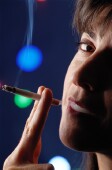
THURSDAY, May 3 (HealthDay News) — Women smokers with certain gene variants are at increased risk for menopausal hot flashes compared to smokers without these genetic differences, a new study says.
An analysis of data from nearly 300 late reproductive-age women who were followed for 11 years showed that smokers with specific variations (single nucleotide polymorphisms) in genes that affect metabolism are more likely to have hot flashes than smokers without these gene variants.
The study appears in the June issue of the Journal of Clinical Endocrinology and Metabolism.
“Our report demonstrates the impact of smoking on hot flashes as a function of variants in genes involved in sex steroid metabolism in late reproductive-age women, and suggests that certain smokers have increased susceptibility to hot flashes based on their genetic background,” lead author Dr. Samantha Butts, of the Perelman School of Medicine at the University of Pennsylvania in Philadelphia, said in a journal news release.
“Women who smoke and carry a particular gene variant may benefit from aggressive targeted approaches to smoking cessation, especially if they know that smoking is a significant contributor to their menopausal symptoms,” she added.
Previous research has shown that smoking is linked with earlier onset of menopause, increased risk of hot flashes and heightened risk of postmenopausal osteoporosis.
“The toxins in cigarette smoke that are believed to be associated with hot flashes are also present in many forms in the environment, which means even non-smokers who have certain [single nucleotide polymorphisms] could be at risk for symptoms,” Butts said.
It is possible that, for women carrying the relevant single nucleotide polymorphisms, smoking could challenge reproductive success in young women trying to become pregnant and present health risks well into menopause, making this an even broader public health consideration, Butts added.
More information
The U.S. Department of Health and Human Services Office on Women’s Health offers advice for dealing with hot flashes and other menopause symptoms.

